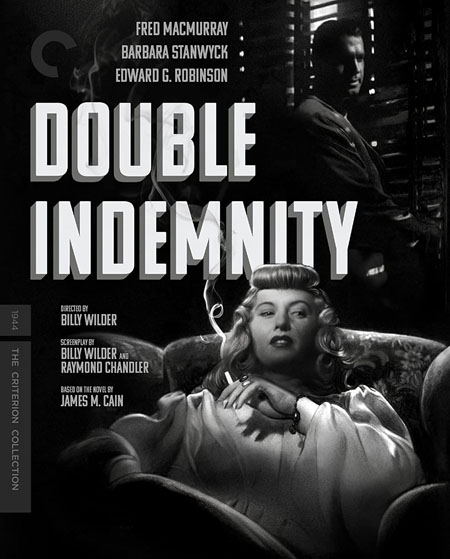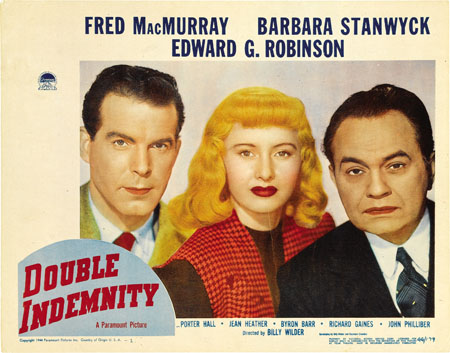
“THERE’S A
SPEED LIMIT IN THIS TOWN”
By
Raymond Benson
If
any film can be called the quintessential film noir, it has to be Double
Indemnity. Even film noir scholar Eddie Muller, the go-to author and
historian who seems to appear in every supplemental feature attached to Blu-ray
and DVD disks of film noir titles, agrees.
Double
Indemnity,
directed by Billy Wilder and released in 1944, contains every cinematic trait
that is associated with film noir: cynical characters, a femme fatale,
betrayal, voice-over narration, witty dialogue, contrasting light and shadow,
German expressionism in the production design and camerawork, smoking,
drinking, murder, and an unhappy ending.
Based
on James M. Cain’s scandalous 1943 novel (but it was first serialized in Liberty
magazine in 1936), the picture was a challenge to the Hays Office censors,
for the Production Code was heavily enforced at the time. Several studios had attempted
to buy the rights in 1936, but the Hays Office warned producers that the novel
was a non-starter as a Hollywood production. Years later, just after the
separate publication of the book, Paramount tried again and this time, based on
a treatment by Billy Wilder and his writing partner Charles Brackett, they were
able to secure the rights.
Apparently,
Brackett felt the material was too seedy and left the project, so Wilder sought
out a new collaborator to pen the screenplay. Raymond Chandler landed the job,
and the resulting alliance was the stuff of Hollywood gossip and legend. The
two men couldn’t stand working together, but nevertheless the turmoil was the
necessary ingredient. The screenplay, nominated for an Academy Award, is
brilliant. What is especially notable is how the writers fooled the Hays Office
with it. The dialogue was full of innuendo that spelled out to an audience
exactly what was going on, even though no literal words were said that
indicated that two people were committing adultery. Wilder and Chandler
improved Cain’s dialogue in this manner, and it’s a delight to hear what comes
out of the mouths of Barbara Stanwyck, Fred MacMurray, and Edward G. Robinson
during the course of the picture. (Phyllis, responding to unsubtle advances:
“There’s a speed limit in this town.” Walter: “How fast was I going, officer?”)
Walter
Neff (MacMurray) is an insurance salesman who calls on the Dietrichson house to
renew an auto policy, but Mr. Dietrichson isn’t home. However, his wife,
Phyllis (Stanwyck) is. There is an immediate attraction and flirtation, which
leads to you-know-what. Phyllis eventually talks Walter into getting a life
insurance policy—with a double indemnity clause (it pays double for accidental
death)—for Phyllis’ husband, whom she can’t stand. Once Dietrichson (Tom
Powers) is tricked into signing the policy, the naughty couple set out to
murder him and make it look like an accident, and they succeed. Even Walter’s
canny boss, Barton Keyes (Robinson), who has a “little man” inside of him that
senses when something doesn’t add up, believes the story until he starts to
closely examine all the angles. Throw in Dietrichson’s grown daughter from a
previous marriage, Lola (Jean Heather), and now there’s an additional threat
that comes between Walter and Phyllis. Keyes gets closer to the truth, Walter
gets paranoid, Phyllis goes a little mad, and things heat up to a boiling
point.
The
acting, the direction, the script, the cinematography (by John F. Seitz), the
editing, and the music score (by Miklós Rózsa),
are all superb and were nominated for Oscars in each of these categories
(Stanwyck was up for Best Actress). Why MacMurray and Robinson were not also
nominated is a mystery worthy of Raymond Chandler! More significantly, Double
Indemnity confirmed Billy Wilder’s future in Hollywood as one of the great,
classic filmmakers.
The
picture has been issued on home video many times in all formats, including
Blu-ray. The Criterion Collection has now released two new editions—one in 4K
UHD and Blu-ray combo (three disks), and another in just Blu-ray (two disks). The
4K digital restoration is the best this reviewer has ever seen the movie. It’s
a flawless presentation with an uncompressed monaural soundtrack.

A
vintage audio commentary by Richard Schickel, ported over from previous
releases, is included. Supplements abound. A port-over vintage feature on film
noir (“Shadows of Suspense”) is welcome, but new extras produced by
Criterion are especially fun: an interview with film scholar Noah Isenberg
(editor of Billy Wilder on Assignment); and a lively conversation
between film historians Eddie Muller and Imogen Sara Smith. There are two radio
adaptations—from 1945 and 1950—both starring Stanwyck and MacMurray. The entire
second disk is a three-hour BBC documentary on Billy Wilder (originally on the Arena
program), directed by Volker Schlöndorff and Gisela
Grischow. The booklet comes with an essay by critic Angelica Jade Bastién.
Even
if you already own a previous release of Double Indemnity, the Criterion
Collection’s new edition is a must-have and worth the upgrade. For fans
of film noir, Billy Wilder, the three stars, and solid, edgy filmmaking
that raised eyebrows in 1944 and is still potent today. Highly recommended.
CLICK HERE TO ORDER FROM AMAZON